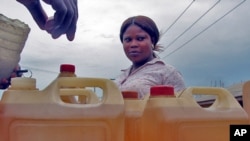Although the United States recently placed in the top tier of a ranking on how transparent countries are with their resources, activists are keeping a close eye on how the U.S. government and American companies deal with resources from other countries, especially Africa.
The United States ranked 11th in the first Revenue Watch Index released this week by Revenue Watch Institute and Transparency International.
The study rated the openness of governments for the management of their oil, gas and mineral resources. Resource monitoring groups say it is an important indicator for economic powers like the United States, but that it is important to improve openness regarding imports and foreign production. They say the United States is making important strides.
The Dodd-Frank Wall Street Reform and Consumer Protection Act, which was signed into law this year, includes an extractive industries disclosure provision. It requires oil, gas and mining companies listed with the U.S. Securities and Exchange Commission to disclose payments made to foreign governments.
"That can be a significant step forward because it means companies like Exxon or Chevron, or U.S. publicly listed oil companies, will have to now disclose on a country by country basis how much they are paying to the governments when they are doing business there," said Arvind Ganesan, the director of the business and human rights program at U.S.-based Human Rights Watch.
The senior policy manager for extractive industries at Oxfam America, Ian Gary, says that in some countries like Angola, one of Africa's main oil producers, all current production and projects coming online are covered by the new U.S. rules.
Angola is not a member of the Extractive Industries Transparency Initiative, or EITI, which seeks to increase payment transparency in resource rich countries on a voluntary basis.
Gary says the new U.S. law strengthens these efforts. "What I think is important is that we see progress on the voluntary initiative side, that countries are measured and their performance is judged by the EITI board, but that we also see other types of provisions like the U.S. law replicated in other markets so that we have broad coverage and more information gets put in the public domain," he said.
Earlier this year, the Hong Kong stock exchange issued new rules requiring payment disclosures by mining companies. The International Accounting Standards Board, which influences accounting rules in more than 100 countries, is considering making payment disclosures by resource companies standard practice.
Arvind Ganesan of Human Rights Watch says aggressive prosecution is also needed when there is evidence of corruption or money laundering.
"If a dictator or their families are buying houses in the United States, there should be a much more aggressive effort to identify those funds and those activities and go after them, so that that money can appropriately go back to the public and the countries where it came from," Ganesan said.
This year, the U.S. Senate began investigating how foreign officials, including those from Angola, Nigeria, Equatorial Guinea and Gabon, have brought millions of dollars into the United States.
Oxfam America's Ian Gary says there has been a great deal of progress toward resource transparency, particularly in getting major corporations to open their books.
"We are seeing various bits of the puzzle come together, so that I am hoping a couple of years from now companies that do not disclose this information will be in the very small minority," Gary said.
But the effects of the new U.S. law will not be immediate. The Securities and Exchange Commission has until the middle of next year to write the regulations needed to implement the Dodd-Frank Act. Then companies will have one fiscal year to respond to the new rules.
Activists Push for US-African Resource Transparency





